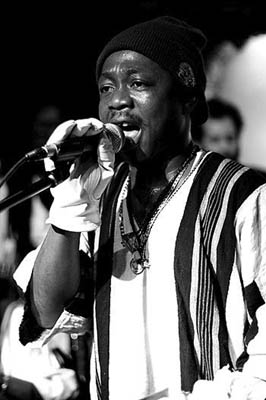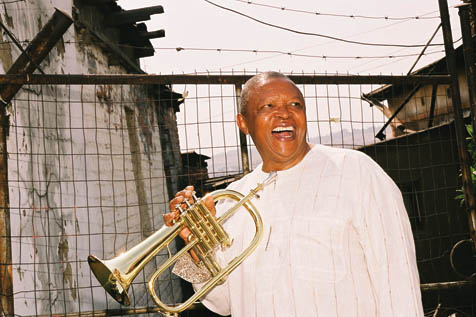African Musicians Bearing Deep Messages
Good Old Days Beginning Now

Nowhere is the power of music more fundamental to life than in Africa, where racist dictatorships have literally been toppled through popular song. The history of contemporary African music intertwines with political history regularly in unexpected, and often profoundly moving, ways. And since the release of the landmark documentary Come Back Africa (1960), made surreptitiously in Sophiatown by legendary filmmaker Lionel Rogosin, the connection of music and politics has been reinforced and amplified by independent filmmaking. After showing two of the best recent documentaries to explore African music and activism-Amandla! and Sierra Leone’s Refugee All Stars-UCSB Arts & Lectures welcomes two of the most remarkable of these African musical groups this month with a concert by Hugh Masekela and his Chissa All-Stars on Friday, February 8, and another by Sierra Leone’s Refugee All Stars on Friday, February 15.
For these musicians, nostalgia is not an option. As Hugh Masekela says at the end of Amandla!, “For us, with the end of apartheid, we feel our ‘good old days’ can now begin.”
I spoke with both Masekela and Reuben Koroma, leader of Sierra Leone’s Refugee All Stars, last week.

Reuben Koroma
What was it like to return to your home in Freetown after spending years in exile? Everything was new. Most of the people I had known there had been displaced and I couldn’t find them anymore. I had to look and look for them because my old contacts were no more. The only people I found easily were some of my former band members, through the music. It allowed us to find one another even when all the old places were gone.
How did you meet the film’s directors? Banker [White] and Zach [Niles] came to the camp in Guinea. We had already formed the band in 1998, so when they arrived in 2002, we were ready to do something. Before that, we had just been playing songs, but the film gave us something because it created a priority for us, which was to develop our music.
You’re in New Orleans today. How is that? I really like New Orleans. I can tell it is a special place, and it reminds me of Freetown. The streets are nice and tight, and some of the buildings look the same. Besides, it’s almost the only place we’ve been on this tour where it’s not cold! It’s 74 degrees today, and sunny. It’s nice.
And you’ve been working with Joe Perry and Aerosmith. How did that come about? Their promoters saw our documentary and liked it, so we sent them some songs, and we ended up in the studio together, recording music with Aerosmith. Actually, in Africa, people do know a lot of American rock music, so even before we ever met Joe Perry we had heard of Aerosmith. Honestly, I don’t think any of us ever imagined then that such a thing as what has happened was even possible. It is truly a dream to us. And we remain grateful for the film, because that is what opened those doors for us.
You have taken the name “refugee” and made it something to be proud of. Can you give any counsel to other people like you who have lost their homes? I do have some things to say to refugees. I want them to believe some things with me, like that all is not lost because chances are. Do you understand? “Chances are!” Have a focus and work toward it. Being a refugee, you are down, but that don’t mean you are done. Walk strong in life and you will achieve what your courage can bring you.
That’s great advice. What can you tell those of us who are lucky enough to be at home here in Santa Barbara? We have a theme for this tour, which is Give Peace a Chance. My words for Santa Barbara would be to know that peace is the most precious gift. It is up to us to give it a chance.

Hugh Masekela
Tell me about your company. Is it more than a record label? Chissa was a label at one time, but in its current form, it is conceived more as a structure to uplift the independent operations of music artists in South Africa. We have established 50 percent partnerships with a select group of artists and we are teaching them all the disciplines we think they need to know to succeed as independent artists. They learn engineering, songwriting, creative development, production, booking, and money management with us. Five of the Chissa artists will be performing with me in Santa Barbara, and the whole thing is integrated so that we all are onstage at once.
That’s quite an ambitious concept. Are there any precedents for it? Sure, Stax and Motown both did all these things, but in a different style. There have always been independent record companies; it just hasn’t happened so much yet in Africa. The ultimate aim of our collaboration is to create an entire African entertainment industry. We are our own market, so it makes sense that we should have our own industry to supply that.
Will new technologies of distribution have an impact on Chissa? Most music in Africa is still distributed on cassette tapes, if that’s what you are asking. But recording technology advances are very important to us, because it is now easier to do it yourself without an expensive studio. And the fact that we still play tapes doesn’t mean that some people in Africa aren’t catching up. Africans love music, so whatever happens in music will happen in Africa.
How would you describe the group you are traveling with? Sibongile Khumalo is a very distinguished performer-the greatest African opera diva. She also sings jazz, but her operatic voice will influence the music we make. Corlea, the other singer, is a great phraser and [scat artist]. Khaya Mahlangu is an outstanding saxophonist, one of the world’s best. The perspective for this tour is very contemporary. It’s a reflection of music to come, but it’s not pop music.
4•1•1 Hugh Masekela and the Chissa All-Stars will play UCSB’s Campbell Hall on Friday, February 8, at 8 p.m. and Sierra Leone’s Refugee All Stars will hit the same stage one week later, on Friday, February 15. Call 893-3535 or visit artsandlectures.ucsb.edu for tickets.



